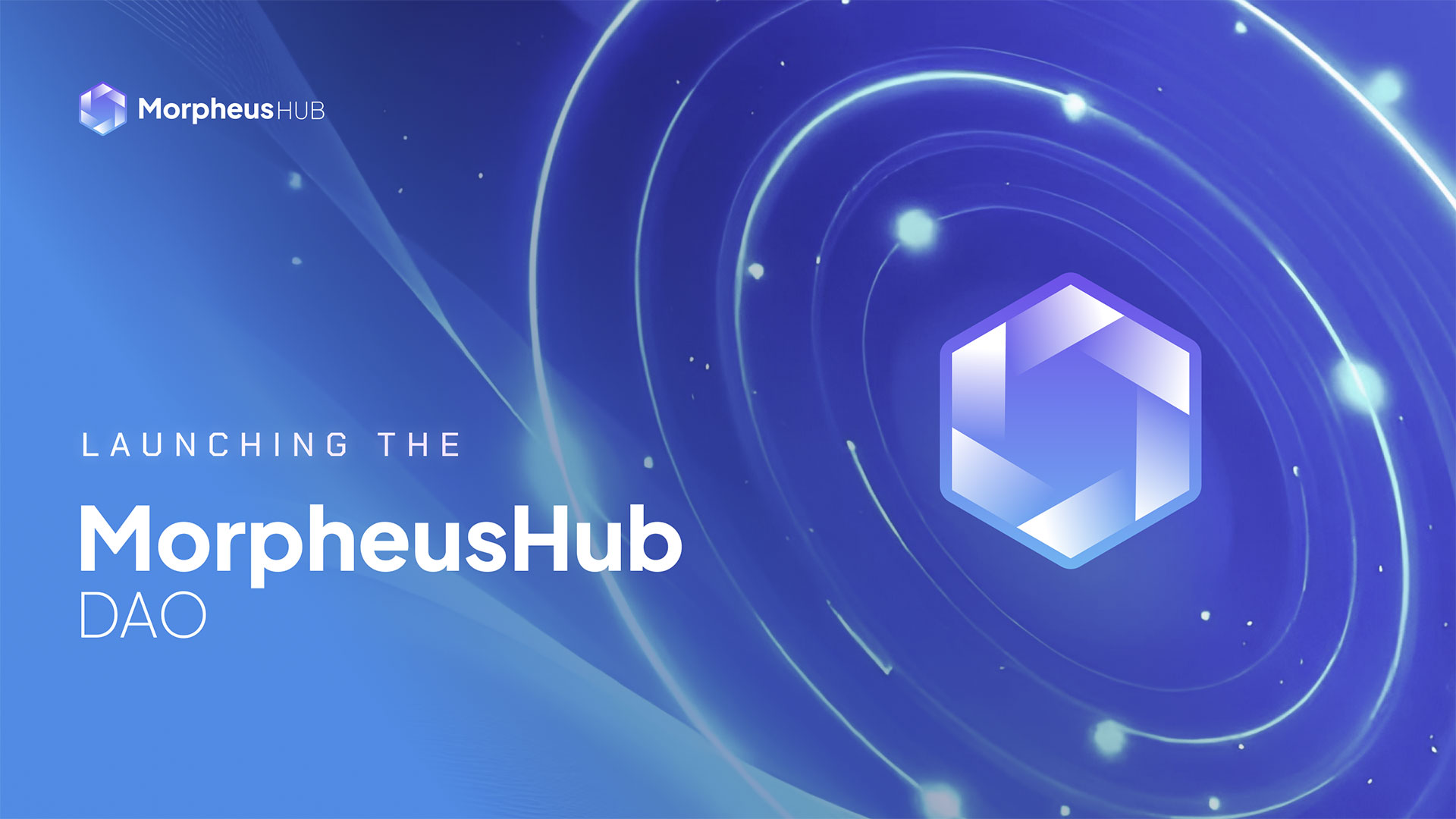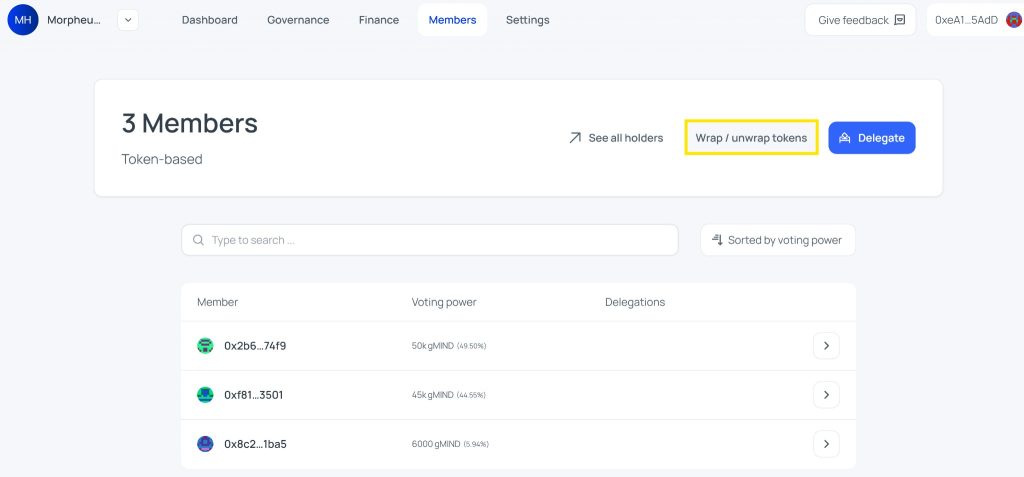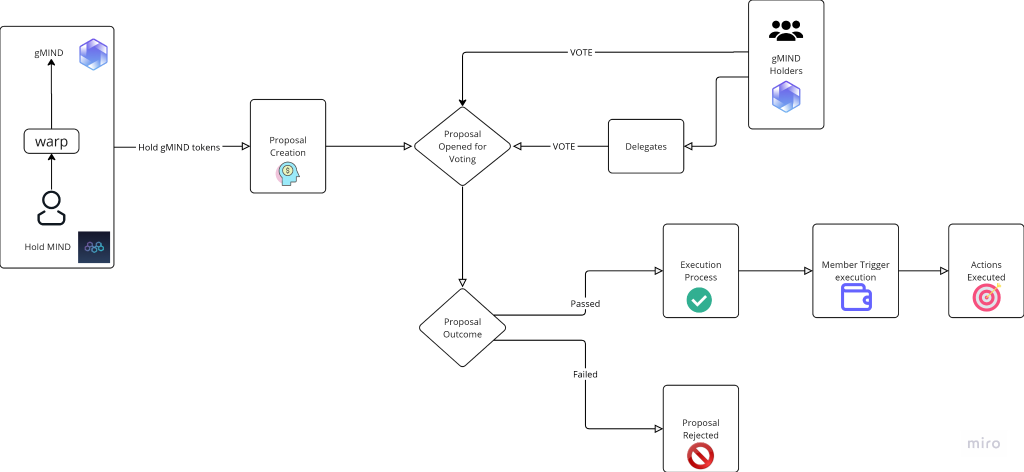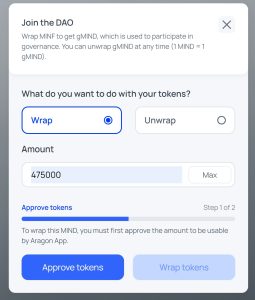
Morpheus Hub DAO Overview & Governance Guide
A DAO Built by the Community, for the Community
In our earlier announcement, we introduced Morpheus Hub DAO—an initiative driven by the growing demand for decentralized governance within our ecosystem. This wasn’t just a strategic move; it came from real demand within our community.
Developers, innovators, and stakeholders want a bigger role in shaping the future of projects built on Morpheus Labs’ AI-powered low-code Web3 platform. To support this momentum, we’re publicly endorsing the DAO’s creation to ensure its success.
Behind the Morpheus Hub DAOMorpheus Hub DAO is a community-driven hub for Web3 growth, designed to empower its members, drive Web3 innovation, and strengthen the $MIND ecosystem. To ensure the DAO operates with security, transparency, and efficiency, selecting the right governance framework was crucial. That’s why we chose Aragon.
Built on the robust and secure Aragon OSx framework, it provides transparent and decentralized governance, giving members a real say in key decisions that shape the future of Web3.
Why Do We Use Aragon?
Aragon has been a pioneer in DAO infrastructure since 2017, facilitating the creation of over 7,500 DAOs that collectively govern more than $35 billion in assets. The Aragon OSx framework offers a modular and secure environment, allowing DAOs to customize governance structures to their specific needs. Notably, the framework has undergone rigorous audits, including a comprehensive review by Halborn in early 2025, ensuring the highest security standards. (GitHub Repository)
WHY Join Morpheus Hub DAO?
Decentralized governance is the future of community-led innovation. Morpheus Hub DAO is designed to empower members to take an active role in shaping the direction of Web3 projects, ensuring that decisions are made transparently and with collective input. Here’s why you should be part of it:
- A DAO Created in Response to Real Ecosystem Demand: The formation of Morpheus Hub DAO stems from a growing need for decentralized governance within the Morpheus Labs ecosystem. Developers, innovators, and stakeholders want a say in the future of projects, and this DAO ensures they have one.
- Exciting Community-Driven Proposals: As a DAO member, you will have the opportunity to witness and participate in proposals for groundbreaking projects.
- Active Contribution to Token Adoption & Utility: By engaging in governance, you can vote on initiatives that integrate rewarding mechanisms and attractive token usage models.
- Real Influence Over the Ecosystem’s Growth: Whether it’s deciding how funds are allocated, which community projects to launch, or how governance evolves, your voice and vote directly impact the future of the $MIND ecosystem.
- Collective Decision-Making with Transparency: Unlike centralized platforms, all proposals, voting, and treasury activities are publicly verifiable on the blockchain, ensuring openness and accountability.
Getting Started: How to Join the DAO
Who Can Participate?
Membership in the Morpheus Hub DAO is open to all $MIND token holders. To foster active participation and maintain the integrity of proposals, the following guidelines have been established:
- Proposal Creation: Members wishing to submit proposals must hold a minimum of 500,000 $MIND tokens or have delegated voting power meeting this threshold.
- Delegation of Voting Power: Token holders can delegate their voting power to trusted members, ensuring their interests are represented even if they choose not to vote directly.
Steps to Get Started
To join the Morpheus Hub DAO:
- Acquire $MIND Tokens: Ensure you hold the necessary amount of $MIND tokens to participate actively. You can obtain $MIND through Kucoin or MEXC.
- Connect Your Wallet: Link your digital wallet to the DAO platform to access governance features.
- Swap MIND for gMIND: Convert your MIND tokens into gMIND (governance MIND) using the DAO’s Token Wrapper Link. This step is required to become a member and participate in voting or proposing initiatives.
- Engage with the Community: Participate in discussions, propose initiatives, and vote on proposals to shape the future of the $MIND ecosystem.
Morpheus Hub DAO link: https://morpheushub.io/dao
How the DAO Works: Voting & Governance
Voting System: gMIND & Delegation
Morpheus Hub DAO operates as a delegated voting DAO built on Aragon OSx. The voting system consists of three key components:
1. Token Wrapper
- To vote, $MIND token holders must wrap their $MIND into gMIND (governance $MIND).
- Wrapped tokens (gMIND) are non-transferable. If users wish to transfer $MIND, they must first unwrap gMIND back into $MIND.
- Wrapping and unwrapping of $MIND tokens can be done in the Token Wrapper app of the DAO platform.

Basics of gMIND token
To participate in governance, $MIND tokens must be converted into gMIND:
- Why wrap $MIND into gMIND?
- The wrapping process ensures that $MIND tokens are compatible with delegated voting functionalities.
- This enables transparent voting and governance participation.
- Can I vote without delegating?
- gMIND holders can vote directly without delegating to another address.
- Delegation is optional and can be changed at any time.
- When is voting power determined?
- A snapshot of gMIND holdings and delegations is taken at the start of a proposal’s voting period.
- This snapshot locks in voting power for that specific proposal.
- Who can be a delegate?
- Any Ethereum address, including a smart contract-owned account (e.g., a multisig address), can receive delegated votes.
2. Voting Period
- When a proposal is created, it enters a voting period.
- Proposal execution is only possible after the voting period ends and if the vote passes.
3. Delegated Voting (gMIND Voting)
- Morpheus Hub DAO allows delegated voting, meaning gMIND holders can delegate their voting power to another address.
- Delegates can see which addresses delegated to them.
- Delegation is flexible: users can delegate or revoke delegation at any time.
- Delegates and gMIND holders can connect to the voting platform via Metamask or WalletConnect.
Proposal Flow & Lifecycle
Types of Proposals
$MIND holders can create proposals in Morpheus Hub DAO. Here there are three proposal examples:
- Enhancement Proposal (EP) – A proposal for an enhancement initiative of the Morpheus Labs existing product.
- Project Proposal – A new project based on $MIND token.
- Expenditure Proposal – A proposal to spend funds from the DAO treasury.
- Governance Settings Proposal – A proposal to change governance permissions and parameters.
Proposal Lifecycle
- Submit Your Proposal
- To submit a proposal, the creator must hold a minimum amount of 500,000 $MIND tokens in their wallet.
- These $MIND tokens need to be warped into governance token gMIND in order to become a member of the DAO and to submit the proposal.
- Proposal Voting Period Begins
- The proposal moves to a voting phase, during which any address holding gMIND (or delegates acting on their behalf) can vote.
- A snapshot is taken at the start of the voting period to lock in voting power.
- Delegates may vote on behalf of gMIND holders.
- gMIND holders can always override their delegate’s vote by voting directly on the proposal.
- Proposal Passed and Executed
- If a proposal meets the support threshold and minimum participation requirements, it is considered passed.
- Any Ethereum address can execute the proposal via the DAO voting platform.
- Execution sends the proposal to mainnet execution, making the changes official.

Governance Model
Our governance model is designed to be transparent, inclusive, and efficient:
- Support Threshold: A proposal passes if more than 50% of the tokens voted are in favor.
- Minimum Participation: At least 15% of the total DAO tokens must participate in a vote for it to be valid.
- Voting Duration: Each proposal remains open for a minimum of 5 days, allowing ample time for member participation.
- Early Execution: Proposals cannot be executed before the voting period concludes.
- Vote Modification: Members have the flexibility to change their votes during the voting period.
Treasury Management and Funding Strategies
A robust treasury strategy ensures the long-term sustainability of the Morpheus Hub DAO while supporting community-driven projects. The treasury will be managed transparently on-chain, with clear funding mechanisms in place:
- Funding Proposals:
- Members can submit proposals for funding initiatives such as ecosystem expansion, research, development grants, marketing efforts, or other activities aligned with the DAO’s mission.
- Each funding proposal must specify the requested amount, purpose, timeline, and expected outcomes.
- Treasury Revenue Streams: These revenues will be determined based on DAO-approved proposals, typically new projects, and may include:
- DAO Fees: A percentage of DAO-related activities, such as service fees, NFT sales, or transaction fees, would be directed to the treasury.
- Staking Rewards: A portion of staking rewards from $MIND token staking mechanisms implemented in various approved projects to be allocated to fund DAO initiatives.
- Crowdfunding: Community-backed funding rounds for specific approved projects, enabling token holders to contribute directly to high-priority projects.
- Expenditure Tracking & Auditing:
- All DAO expenditures are recorded on-chain, ensuring complete transparency.
- A periodic treasury report will be published at the end of the year detailing fund allocations, project progress, and remaining treasury balances.
- A DAO Treasury Committee may be elected to oversee financial planning and ensure funds are used effectively.
- Risk Mitigation Strategies:
- The DAO will diversify its treasury holdings into stable assets to mitigate market volatility.
- Multi-signature wallet management will be enforced to prevent unauthorized fund movements.
- Smart contract audits and community oversight will ensure financial security.
DAO Off-Chain Communication Channels
To foster community engagement and transparent communication, Morpheus Hub DAO is active across Morpheus Labs official channels:
- X (Twitter): https://twitter.com/morpheuslabs_io
- Telegram: https://t.me/morpheuslabs
- LinkedIn: https://www.linkedin.com/company/morpheuslabs-io/
- Discord: https://discord.gg/mbdXpD2fZm
- YouTube: https://www.youtube.com/channel/UCBDcCbFiFDZOcfkGkAo-iLQ
For a comprehensive understanding and to stay updated with the latest developments.
Glossary
- DAO (Decentralized Autonomous Organization) – A blockchain-based entity governed by smart contracts and community voting rather than centralized leadership.
- Governance – The process by which DAO members make collective decisions regarding proposals, rules, and treasury management.
- $MIND Token – The native token of Morpheus Labs, used for governance participation, staking, and transactions within the ecosystem.
- gMIND (Governance MIND) – A wrapped version of $MIND required for voting. It is non-transferable and must be unwrapped to regain $MIND.
- Token Wrapper – The DAO feature where $MIND holders can convert (wrap) their tokens into gMIND (1xMIND=1xgMIND) for governance voting and decision-making.
- Delegation – The process where gMIND holders assign their voting power to another member (delegate) to vote on their behalf.
- Proposal – A formal request submitted by DAO members to implement changes, fund projects, or modify governance rules.
- Enhancement Proposal (EP) – A proposal for an upgrade or improvement to existing Morpheus Labs products.
- Project Proposal – A request to fund and launch a new initiative within the Morpheus Hub DAO ecosystem.
- Expenditure Proposal – A proposal seeking funding from the DAO treasury to support initiatives like marketing, research, or partnerships.
- Governance Settings Proposal – A request to modify DAO governance rules or permissions.
- Voting Period – The fixed timeframe in which DAO members can vote on an active proposal.
- Minimum Participation Threshold – The minimum percentage of total governance tokens that must participate for a vote to be considered valid.
- Treasury – The funding pool managed by the DAO, consisting of MIND tokens and other assets.
- Funding Proposal – A request for treasury funds to finance ecosystem expansion, research, or development grants.
- Multi-Signature Wallet (Multisig) – A secure wallet requiring multiple approvals from DAO members before treasury funds can be accessed or spent.

